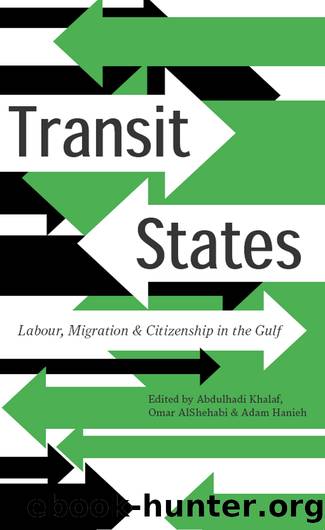Transit States by AlShehabi Omar;Hanieh Adam;Khalaf Abdulhadi;

Author:AlShehabi, Omar;Hanieh, Adam;Khalaf, Abdulhadi;
Language: eng
Format: epub
Publisher: Pluto Press
Urbanising Migration: Connecting Male Migration Flows to GCC City-building Agendas
As Mohammad and Sidaway (2012: 608) note, over the last decade and a half, Gulf cities have pursued âa development path that requires and is expressed via fast urbanizationâ (see also Hvidt, 2011). The restructuring of Gulf political economies since the beginning of the twenty-first century has entailed the concerted urbanisation of both capital and labour, as post-oil liberalisation agendas across the GCC have come to focus heavily on the production of spectacularised, sovereign gestures of urban hyper-building (Ong, 2011) as well as diverse experiments with affluent enclave developments undergirded by consumer-oriented forms of urbanism (Elsheshtawy, 2010; see also Chapter 5). Similarly, the ongoing tertiarisation of contemporary Gulf economies â which have been marked by efforts to foster the growth of liberalised, service sector local economies focused on services like regional and global financial services, telecommunications and retailing â has resulted in Gulf cities becoming crucial sites in which processes of regional integration and national economic diversification are playing out (Hanieh, 2010a; Buckley and Hanieh, 2014).
The vast urbanisation of both private and sovereign capital has been partly a response to processes of GCC market integration and harmonisation, in which recent post-oil diversification programmes adopted by states in the region have been modelled in part after Dubaiâs real estate growth strategies, intended to encourage greater foreign direct and indirect investment into new specially designated urban mega-projects. As a result, construction activity has contributed significantly to GDP growth in most GCC states over the past decade (Hanieh, 2011: 112â15; Buckley, 2012a). Hanieh (2011) notes that this trend has been most prominent in the UAE and Saudi Arabia, in which mega-project urbanisation has characterised the circulation of oil and investor capital into the built environments of a number of cities in these countries including, and particularly, Dubai.
While the state-led push to develop urban mega-project markets across the region has been especially lucrative for Gulf-based construction conglomerates (Hanieh, 2011; Buckley and Hanieh, 2014), the construction industry more generally has been particularly resistant to national programmes aimed at nationalising the private sector workforce. Particularly at the lower end of the industryâs occupational segments, construction work is comprised of a diverse range of jobs that are often dirty, dangerous, low status and poorly paid. The professional occupational segments in the industry in Dubai, meanwhile, are also almost overwhelmingly comprised of professional migrants, whose jobs are better remunerated but often involve working extremely long hours. Thus construction has long been, and remains, a key industry for migrant work and employment in Dubai and across the region.
The growth of construction activity across the Gulf region, meanwhile, has necessitated the vast importation of construction labour at both the top and the bottom of the industryâs occupational segments. The ethno-national background of workers in the lower tiers of the industry varies; workers from southern India have been among the most common, while Pakistani, Bangladeshi, Nepalese, Filipino and Sri Lankan workers also comprise significant numbers in the lower-waged ends of the industry.
Download
This site does not store any files on its server. We only index and link to content provided by other sites. Please contact the content providers to delete copyright contents if any and email us, we'll remove relevant links or contents immediately.
Life 3.0: Being Human in the Age of Artificial Intelligence by Tegmark Max(5193)
The Sports Rules Book by Human Kinetics(4079)
The Age of Surveillance Capitalism by Shoshana Zuboff(3991)
ACT Math For Dummies by Zegarelli Mark(3855)
Blood, Sweat, and Pixels by Jason Schreier(3498)
Unlabel: Selling You Without Selling Out by Marc Ecko(3473)
Hidden Persuasion: 33 psychological influence techniques in advertising by Marc Andrews & Matthijs van Leeuwen & Rick van Baaren(3293)
Urban Outlaw by Magnus Walker(3245)
The Pixar Touch by David A. Price(3215)
Bad Pharma by Ben Goldacre(3101)
Project Animal Farm: An Accidental Journey into the Secret World of Farming and the Truth About Our Food by Sonia Faruqi(3019)
Brotopia by Emily Chang(2898)
Kitchen confidential by Anthony Bourdain(2834)
Slugfest by Reed Tucker(2805)
The Content Trap by Bharat Anand(2780)
The Airbnb Story by Leigh Gallagher(2704)
Coffee for One by KJ Fallon(2423)
Smuggler's Cove: Exotic Cocktails, Rum, and the Cult of Tiki by Martin Cate & Rebecca Cate(2340)
Beer is proof God loves us by Charles W. Bamforth(2252)
